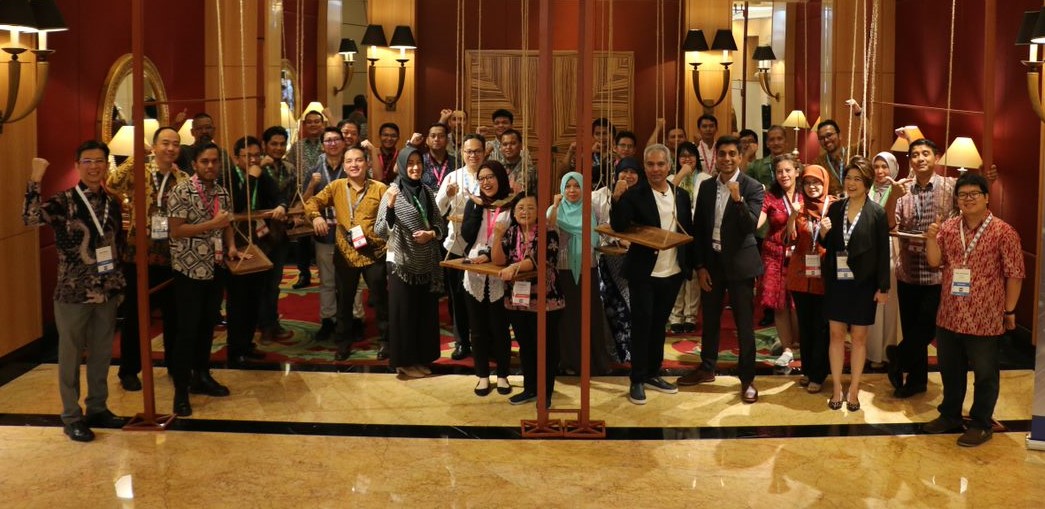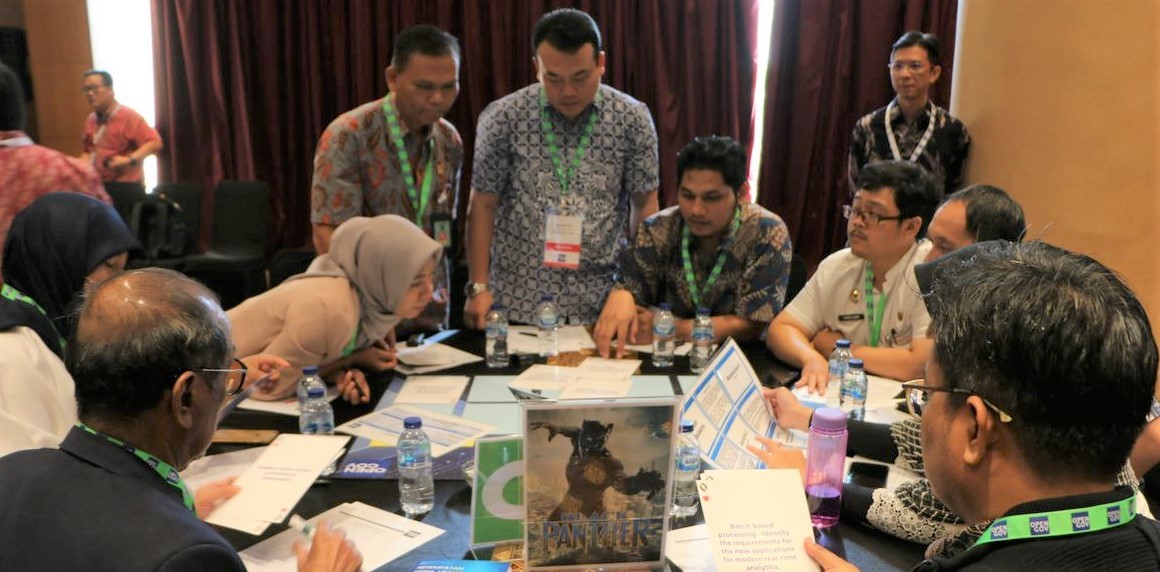
Across the world, governments are ramping up their digital transformation efforts in a bid to provide more efficient citizen-services. These efforts play an important role in the development and deployment of AI, seen as a keystone technology for Smart Nations.
Indonesia is no exception and has been intensely exploring the use of artificial/augmented intelligence in its governance design.
Still in the early stages of its digital transformation journey, Indonesia, has the potential to embed AI technology effectively and efficiently into its public sector strategy.
Early adopters of disruptive technology, including AI, have primarily been in the private sector. The fin-tech sector has seen its fair share of tech-based ventures. Go-Pay, DANA, and OVO that use QR Code payments are good examples of companies that have been successful in their adoption of technology in Indonesia.
OpenGov Tech Day: Powering Government Transformation Through AI allowed those at the helm of the Indonesian digital journey to explore, discuss and determine cutting-edge developments and solutions.
The event which took place on Friday, 25th October 2019 at JW Marriott Hotel, Jakarta, saw senior digital executives from a wide cross-section of the government agencies convene to collaboratively learn how government could be better empowered through AI.
The Tech Day is part of a series of events that started with the Powering a Smart Nation Initiatives through AI in Singapore on 23 October 2019.
Both events saw delegates actively discussing ways to optimise data, better serve citizens and drive the digital economy through technology and by leveraging AI to create data-centric infrastructure.
AI will help Indonesia transform into a smart nation

Mohit Sagar, Managing Director and Editor-in-Chief at OpenGov Asia was firm in his conviction that artificial / augmented intelligence (AI) could help Indonesia transform into a smart nation.
AI allows for data to be collected effectively and accurately as well as ensuring data is intelligent and actionable.
A data-driven strategy is key to a successful transformation. As such, Mohit stressed the importance of data – its collection, collation and care.
Additionally, it can be used to optimise data in areas such as availability and processing, all of which could be incorporated in a unified hybrid cloud.
“AI gives one tangible insight and helps make decisions based on intelligent data; not on assumptions, notions or emotions.”
Mohit pointed out that security, privacy and ethics are common caveats that are raised when talking about cloud and data.
However, these concerns should not be impediments to the adoption of technology; rather, they should be used to guide an intentional cloud strategy.
Mohit emphasised the need to push boundaries to transform the country into a smart nation. “We need to find solutions; with disruptive technologies available, the speed at what we can do this is changing rapidly.”
Sunil Chavan, Vice President, Flashblade Sales, Pure Storage, Asia Pacific and Japan

Sunil Chavan, Vice President, Flashblade Sales, Pure Storage, Asia Pacific and Japan talked about fluidity when deploying AI.
In the application of AI, he opined, it needs to be understood that the technology is not rigid. Indeed, technology is changing rapidly and evolving constantly.
None the less, the human factor is very important when working towards becoming a smart nation.
Jakarta is looking to transform into a smart city using smart governance. This will have a profound influence on government policy, infrastructure and design.
He cited the application of airport data security in Hong Kong and the cargo delivery and tracking system in Korea as examples of smart governance.
Sunil felt that Jakarta could learn from Singapore as it exemplifies the modern digital experience, with data being used in real-time.
The government exists to serve its citizens; and as citizens are increasingly becoming digital natives, digital solutions built on accurate, intelligent, secure data is fast becoming the norm.
Therefore, it is imperative for the governance framework to accommodate this paradigm shift and allow for rapid, effective technology adoption.
Only a current framework, he concluded, would be able to deal with the biggest challenges in deploying AI in the smart nation journey.
Setting the Base-line
In order to create an accurate base-line for discussion, OpenGov polled delegates around key issues. The results helped inform the facilitators as well as guide the discussions.
Over 2/3rds of the participants believed that IT transformation was aimed at digital transformation and innovation.
Close to half the group said that their key focus for the next 12 months would be modern and real-time data analytics – indicating the importance placed on data.
Interestingly, 44% felt that “logs” was the most important type of data that needed to be collected.
Significantly, about 40% felt that “shortage of skilled personnel” would be a key challenge when embarking on Data Analytics and AI projects.
“Fast accessibility – being able to get the data quickly” was seen as the biggest challenge in data management according to 46% of respondents.
Gamification Sessions
The gamification session was broken down into three scenarios and three rounds. Delegates were made citizens of “Country Wakanda” where Smart Nation initiatives were being rolled out with the focus on millennials.
As part of the gamification, teams were provided with a list of solutions to choose from. Solutions had been pre-classified according to optimal/non-optimal answers but were not revealed to the teams. The greater the number of optimal answers chosen by teams as their recommended solutions, the more points they received.
Teams were also able to provide wild card answers which were solutions of their own.
Gamification session I
Scenario 1 showed senior citizens in Wakanda increasingly consuming data for e-services, resulting in the slowing down of systems. Teams were tasked to review their strategy framework to solve the issue.
 This round interestingly saw teams choose non-optimal answers such as “batch based on processing” and “design a data driven architecture framework” to be their recommended solutions.
This round interestingly saw teams choose non-optimal answers such as “batch based on processing” and “design a data driven architecture framework” to be their recommended solutions.
When breaking down the solutions and justifying their choices, one of the teams felt the optimal answer, “decouple and scale storage and compute separately”, seemed impractical of a solution.
“This option, in my opinion, is a decision that is too fast. It’s like a quick solution. The first priority step should be to investigate and then scale the storage,” explained a team member.
Gamification session II
Scenario 2 saw teams having to create a data hub that will provide a single common platform. The situation required them to achieve three things: consolidate multiple data takes into a Data Hub; have provision to add new data source; and performance improvement with a Data Hub in order to meet SLAs.
 In the given the scenario, all four teams were comfortable with the available options and selected choices from the optimal answers.
In the given the scenario, all four teams were comfortable with the available options and selected choices from the optimal answers.
One proposal was to redesign architecture so that they can massively support parallel multi-dimensional multi-performance performance to meet the SLA for all e-Services.
A second suggestion was about eliminating any under-performing system or data leaks. The third one required running multiple workloads in a single high-performance all-flash data hub.
The fourth suggestion involved reducing or eliminating data movement across multiple systems or data tasks.
To complete the list of optimal answers, the fifth suggestion was to investigate with the use of secure on open S2NFS for Hyper-Scale web.
Gamification session III
 The third scenario saw teams having to produce considerations for building an AI-ready infrastructure to support the launch of autonomous vehicles to complement the current public transport offerings.
The third scenario saw teams having to produce considerations for building an AI-ready infrastructure to support the launch of autonomous vehicles to complement the current public transport offerings.
All four groups chose most of the optimal answers such as: “deploy certified reference architecture for AI / ML” and “support end to end AI / ML pipelines without data movement / copy across systems or AI node”. None of the groups had chosen green initiatives, which was one of the optimal answers.
Conclusion
Participants gained clear insights from the intensive discussions and activities.
Rohmayani, Sub Lead Division of Application and Network System at the Ministry of Law and Human Rights mentioned that the topic of AI and hybrid cloud is very helpful and can be a guide for overcoming technical problems that may arise, especially in the E-Gov application.
Delegates left the session with a better understanding of how AI can be adopted and be effectively used to govern a nation.
















